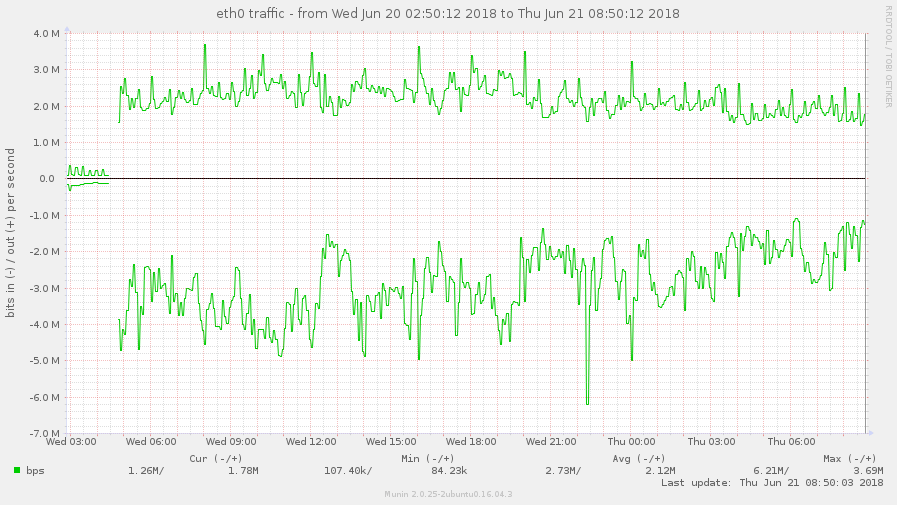Munin in Docker
Munin is a networked resource monitoring tool that can help analyze resource trends and "what just happened to kill our performance?" problems. It is designed to be very plug and play. A default installation provides a lot of graphs with almost no work.

Using Munin you can easily monitor the performance of your computers, networks, SANs, applications, weather measurements and whatever comes to mind. It makes it easy to determine "what's different today" when a performance problem crops up. It makes it easy to see how you're doing capacity-wise on any resources.
Munin uses the excellent RRDTool (written by Tobi Oetiker) and the framework is written in Perl, while plugins may be written in any language. Munin has a master/node architecture in which the master connects to all the nodes at regular intervals and asks them for data. It then stores the data in RRD files, and (if needed) updates the graphs. One of the main goals has been ease of creating new plugins (graphs).
Munin Requirements
Ingredients
Already deployed:
- Docker swarm cluster with persistent shared storage
- Traefik configured per design
- DNS entry for the hostname you intend to use (or a wildcard), pointed to your keepalived IP
Related:
- Traefik Forward Auth or Authelia to secure your Traefik-exposed services with an additional layer of authentication
Preparation
Prepare target nodes
Depending on what you want to monitor, you'll want to install munin-node. On Ubuntu/Debian, you'll use apt-get install munin-node, and on RHEL/CentOS, run yum install munin-node. Remember to edit /etc/munin/munin-node.conf, and set your node to allow the server to poll it, by adding cidr_allow x.x.x.x/x.
On CentOS Atomic, of course, you can't install munin-node directly, but you can run it as a containerized instance. In this case, you can't use swarm since you need the container running in privileged mode, so launch a munin-node container on each atomic host using:
docker run -d --name munin-node --restart=always \
--privileged --net=host \
-v /:/rootfs:ro \
-v /sys:/sys:ro \
-e ALLOW="cidr_allow 0.0.0.0/0" \
-p 4949:4949 \
--restart=always \
funkypenguin/munin-node
Setup data locations
We'll need several directories to bind-mount into our container, so create them in /var/data/munin:
mkdir /var/data/munin
cd /var/data/munin
mkdir -p {log,lib,run,cache}
Prepare Munin environment
Create /var/data/config/munin/munin.env, and populate with the following variables. Set at a minimum the MUNIN_USER, MUNIN_PASSWORD, and NODES values:
MUNIN_USER=odin
MUNIN_PASSWORD=lokiisadopted
SMTP_HOST=smtp.example.com
SMTP_PORT=587
SMTP_USERNAME=smtp-username
SMTP_PASSWORD=smtp-password
SMTP_USE_TLS=false
SMTP_ALWAYS_SEND=false
SMTP_MESSAGE='[${var:group};${var:host}] -> ${var:graph_title} -> warnings: ${loop<,>:wfields ${var:label}=${var:value}} / criticals: ${loop<,>:cfields ${var:label}=${var:value}}'
ALERT_RECIPIENT=monitoring@example.com
ALERT_SENDER=alerts@example.com
NODES="node1:192.168.1.1 node2:192.168.1.2 node3:192.168.1.3"
SNMP_NODES="router1:10.0.0.254:9999"
Munin Docker Swarm config
Create a docker swarm config file in docker-compose syntax (v3), something like the example below:
Fast-track with premix! 🚀
I automatically and instantly share (with my sponsors) a private "premix" git repository, which includes necessary docker-compose and env files for all published recipes. This means that sponsors can launch any recipe with just a git pull and a docker stack deploy 👍.
🚀 Update: Premix now includes an ansible playbook, so that sponsors can deploy an entire stack + recipes, with a single ansible command! (more here)
version: '3'
services:
munin:
image: funkypenguin/munin-server
env_file: /var/data/config/munin/munin.env
networks:
- traefik_public
volumes:
- /var/data/munin/log:/var/log/munin
- /var/data/munin/lib:/var/lib/munin
- /var/data/munin/run:/var/run/munin
- /var/data/munin/cache:/var/cache/munin
deploy:
labels:
# traefik common
- traefik.enable=true
- traefik.docker.network=traefik_public
# traefikv1
- traefik.frontend.rule=Host:munin.example.com
- traefik.port=8080
# traefikv2
- "traefik.http.routers.munin.rule=Host(`munin.example.com`)"
- "traefik.http.services.munin.loadbalancer.server.port=8080"
- "traefik.enable=true"
# Remove if you wish to access the URL directly
- "traefik.http.routers.wekan.middlewares=forward-auth@file"
networks:
traefik_public:
external: true
Note
Setup unique static subnets for every stack you deploy. This avoids IP/gateway conflicts which can otherwise occur when you're creating/removing stacks a lot. See my list here.
Serving
Launch Munin stack
Launch the Munin stack by running docker stack deploy munin -c <path -to-docker-compose.yml>
Log into your new instance at https://YOUR-FQDN, with user and password password you specified in munin.env above.
Chef's notes 📓
-
If you wanted to expose the Munin UI directly, you could remove the traefik-forward-auth from the design. ↩
Tip your waiter (sponsor) 👏
Did you receive excellent service? Want to compliment the chef? (..and support development of current and future recipes!) Sponsor me on Github / Ko-Fi / Patreon, or see the contribute page for more (free or paid) ways to say thank you! 👏
Employ your chef (engage) 🤝
Is this too much of a geeky PITA? Do you just want results, stat? I do this for a living - I'm a full-time Kubernetes contractor, providing consulting and engineering expertise to businesses needing short-term, short-notice support in the cloud-native space, including AWS/Azure/GKE, Kubernetes, CI/CD and automation.
Learn more about working with me here.
Flirt with waiter (subscribe) 💌
Want to know now when this recipe gets updated, or when future recipes are added? Subscribe to the RSS feed, or leave your email address below, and we'll keep you updated.